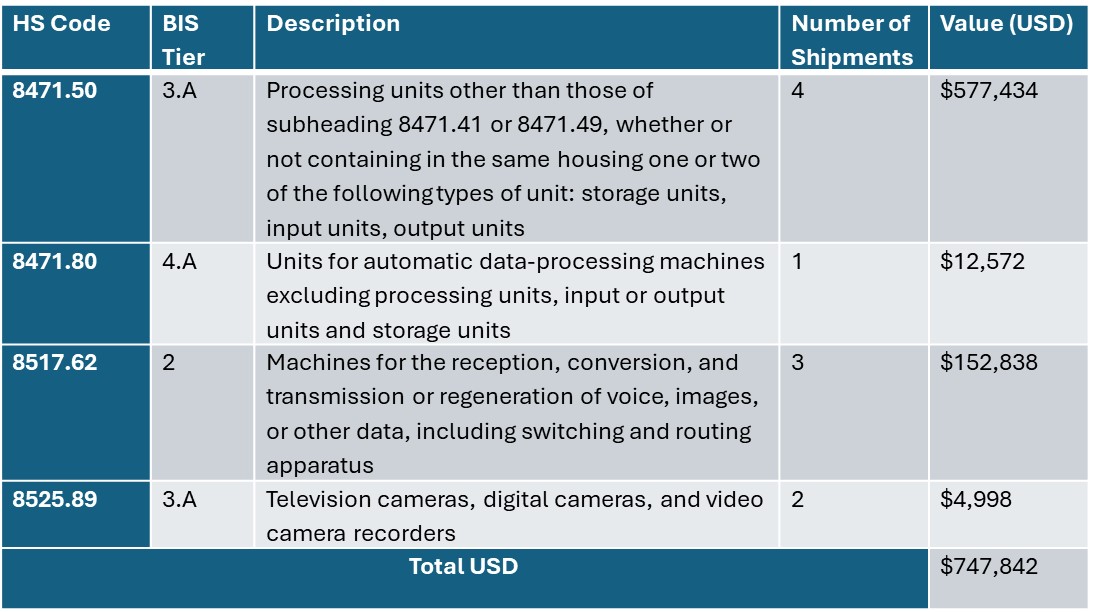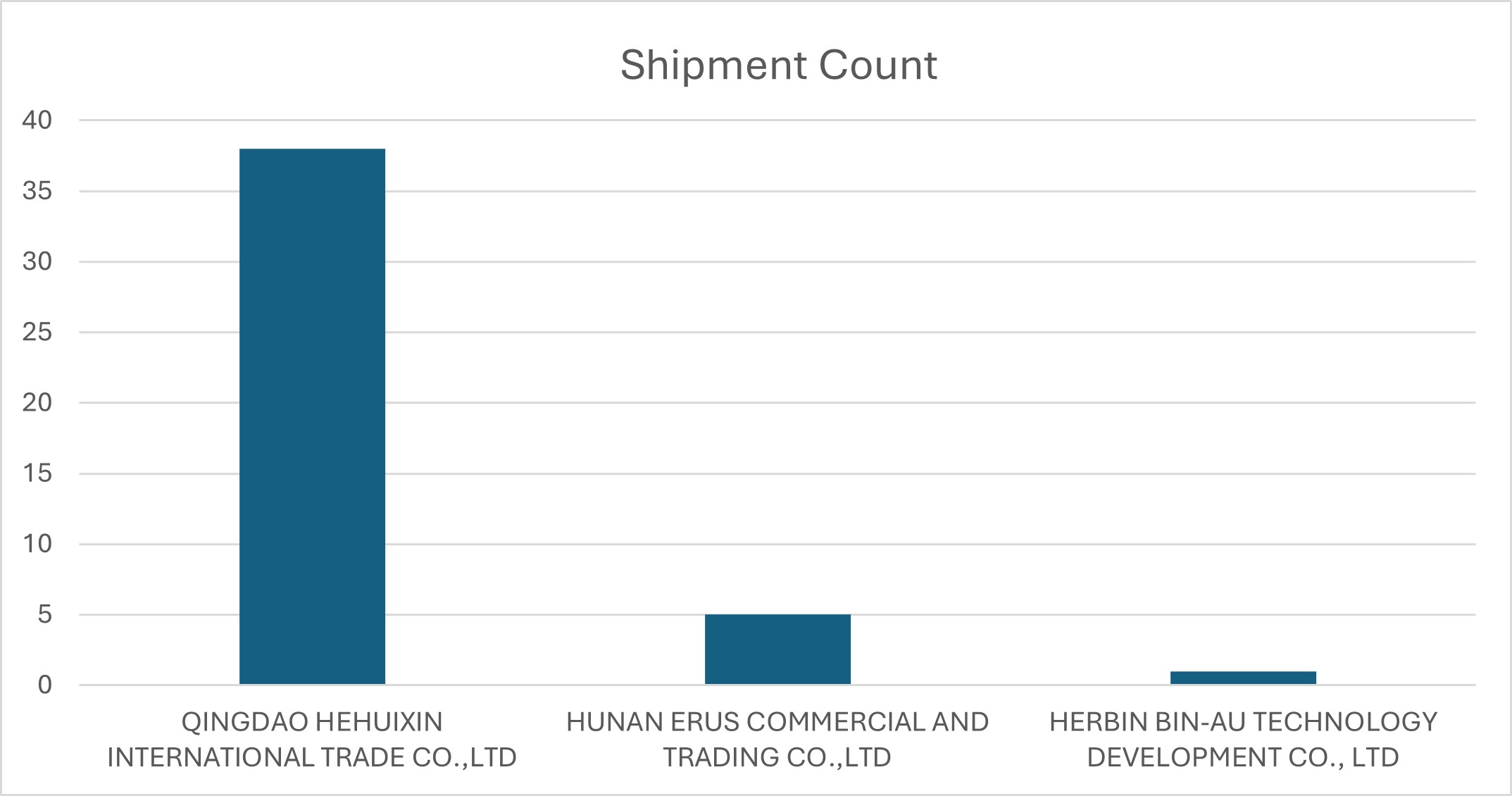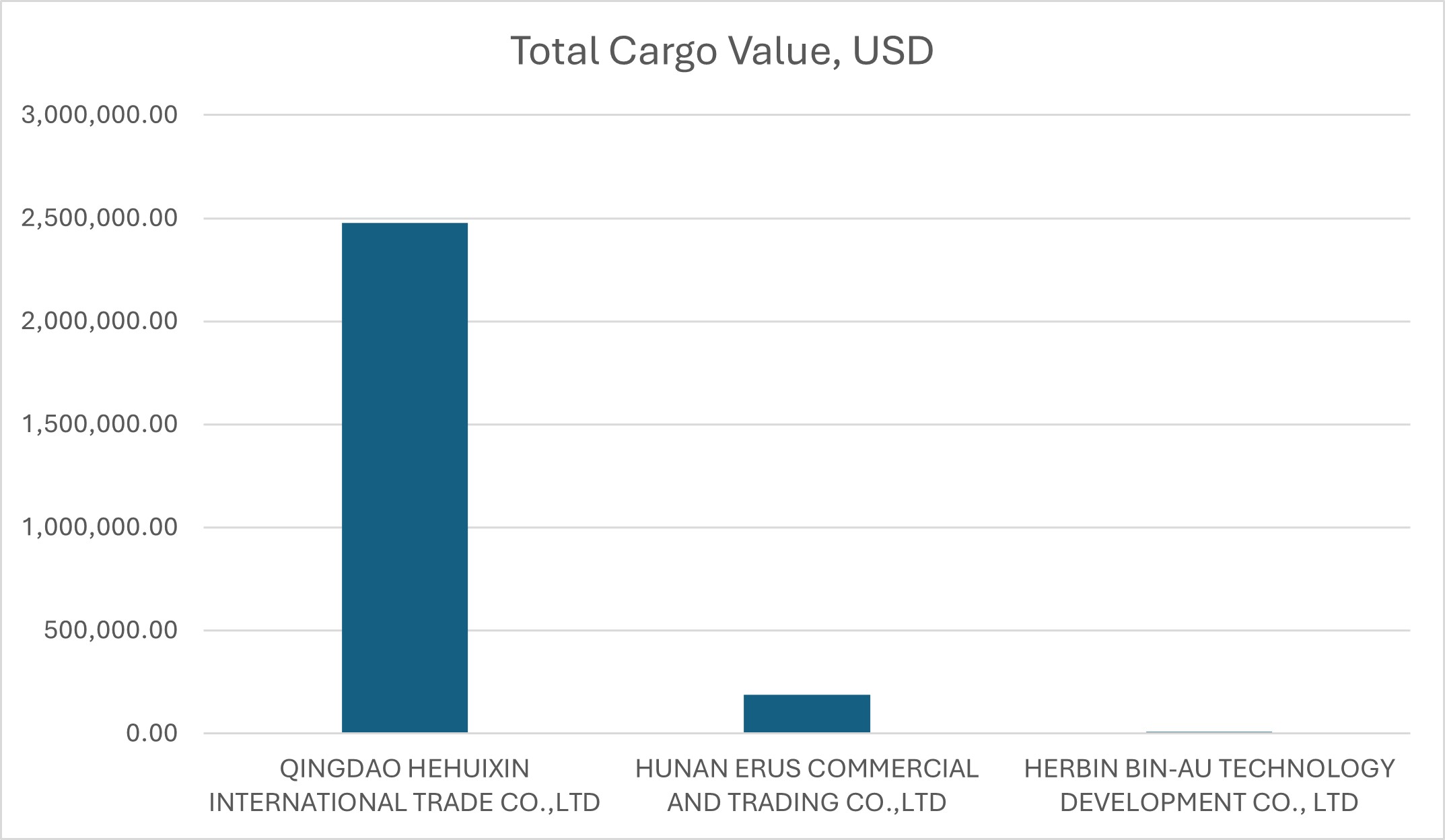With the onset of Russia's invasion of Ukraine, JSC Alabuga shifted from centering on hosting domestic and international civilian manufacturing facilities at its Special Economic Zone (SEZ) to direct military production of military drones, in particular the Shahed 136 kamikaze drone under a supply and franchise contract with Iran. This shift has necessitated the large-scale procurement of a variety of different types of goods abroad. One of JSC Alabuga's important procurement arms has been Drake LLC, aka Dreik LLC, which contracts with Alabuga Development Company, JSC Alabuga's main construction and production arm. Drake's role in outfitting military industries was recognized on February 23, 2024, when it was sanctioned by the United States. However, its precise dealings which warranted this designation have received little public scrutiny.
The case of Drake exposes a part of Alabuga's drone production supply chain and its broader interest in military drones in addition to the Shahed 136 drone. This case study reveals how Alabuga Development Company purchased in early 2023 via Drake and a third party in Kazakhstan, DRONE.kz, up to 30 Dragonfish drones from Autel Robotics, a major Chinese drone manufacturer with a strong U.S. presence, for modification at Alabuga for military use in Ukraine. The planned changes included extending the drone's range, strengthening its ability to defeat jamming from enemy electronic warfare systems, and/or attaching a universal delivery system for a variety of ordnance, such as grenades and video-guided rocket propelled grenades.
This case study also shows Drake's use of third-party countries, such as China, to obtain Western electronic goods and in at least one case, internal combustion engines for radio-controlled aircraft. Several of the items have HS codes that are on the U.S., EU , Japan, and UK Common High Priority List (CHPL) of items restricted for export to Russia. The fact that the Chinese shippers involved are obscure and have very little online presence shows a further effort on the part of Drake to conceal its tracks in its goal of obtaining Western commodities. This case also shows the involvement of an Austrian bank, Raiffeisen Bank International, as Drake's correspondent bank in its purchase of Autel drones from the Kazakh drone reseller.
This report is part of a long set of analyses identifying key players in Russia's growing military industrial complex, and the foreign producers, trading companies, and third-party suppliers that are supplying Russia with key commodities. Often, Western and Chinese commodities are critical components in Russian combat systems, enabling advanced capabilities which they otherwise would not have. Without Western commodities, including Western electronic integrated circuits, microcomputers, and field programmable gate arrays, Russia would be forced to use inferior quality components in its navigation and anti-jamming equipment.
Because of Russia's actions, many entities have been sanctioned. This case study shows that members of Drake's supply chain, both suppliers and financial entities, deserve scrutiny and possibly U.S. and European sanctions. In particular, despite EU and US pressure, Raiffeisen Bank has resisted ending its business in Russia, although it has stated that it has ceased its correspondent banking business. [1] While small-scale exemptions may be warranted for financial arrangements for medical supplies, Raiffeisen's activities are far larger than that. The question of whether or not Autel continues to sell drones to Alabuga via intermediaries should be clarified. In addition, the sale by DRONE.kz to Drake deserves sanctioning, or at least any further sales by DRONE.kz to Russian entities should warrant sanctioning.
Drake Procurements
Drake LLC (TIN 1646047020) is a closely aligned subcontractor of Alabuga Development Company, which builds the Shahed 136 drones under JSC Alabuga and develops other drones for military use against Ukraine. In this case, Drake, as subcontractor, was a purchaser of goods for a project approved by JSC Alabuga aimed at selling drones to the Russian military for use against Ukraine. In leaked JSC Alabuga documents, Drake's General Director was listed as A.A. Sapozhnikov in some documents and in others as E.A. Alekseenko. When Alekseenko was listed as Drake's General Director in a document, Sapozhnikov was listed as Drake's Project Manager.
The company is listed as registered in May 2019 in official Russian registries as a manufacturer of agricultural and forestry machinery and equipment. Drake's historical relationship with Alabuga and its role in buying for Alabuga Development Company before the war are unclear.
Many of Drake's purchases are made overseas. Two types of overseas procurements will be considered, a contractual arrangement with the Kazakhstan drone reseller DRONE.kz and several imports found in trade data.
Dragonfish Drones
In late 2022 and early 2023, Drake purchased Dragonfish drones from Autel Robotics via a Kazakhstan drone reseller, DRONE.kz LLP, which advertises a wide range of drones. The Dragonfish is a reliable drone designed for aerial surveillance and is used in police law enforcement, forest fire prevention, electric power inspection, traffic law enforcement, coastal defense, and agricultural monitoring. Drake's purchase of the Chinese drones was done under a contract with Alabuga Development Company, a subcompany of JSC Alabuga, which runs the Alabuga Special Economic Zone in Tatarstan and is well known for building Shahed 136 drones for the Russian Army. Less well known is Alabuga's interest in other drones for supply to the Russian military.
The Autel drones were slated for modification at Alabuga under a plan for developing an industrial capability to weaponize the Dragonfish drones for sale to the Russian military. The planned modifications included lengthening the drone's range, putting in a much stronger signal for countering jamming from electronic warfare systems, installing a Russian map and coordinate system, and attaching a universal delivery system for a variety of ordnance, from grenades to video-guided rocket propelled grenades.
The mid-December 2022 contract between Alabuga Development Company and Drake listed a purchase price for the 29 Dragonfish drones of 340.8 million rubles, which includes a 20 percent VAT, and customs and logistics costs. In terms of U.S. dollars (USD), the contract was valued at $5.26 million on that day. The above contract price in rubles was fixed for the duration of the contract, which created problems later as the value of the ruble significantly dropped after the signing date of the contract. Both companies had accounts at AK BARS Bank PJSC, Kazan, a leading regional bank. This contract was signed by Sapozhikov as Drake's Director General and S.V. Bochikhin on behalf of Alabuga Development.
Drake in turn signed a contract with DRONE.kz on the same day, agreeing to pay $4.31 million for the Chinese drones, U.S. dollars being the currency required by the drone supplier. Sapozhikov signed for Drake, and Director A.S. Unruh signed for DRONE.kz. Drake paid DRONE.kz in tenge, Kazakhstan's currency, but the amounts were converted into USD, because the contract required that all payments from Drake to DRONE.kz be made by bank transfer in USD. In the contract, Drake listed its beneficiary bank as JSC CB Solidarnost, which was added to the U.S. Treasury Department SDN list on July 20, 2023. Its correspondent bank was listed on the contract as Raiffeisen Bank International, Vienna, Austria.
In this contract, DRONE.kz listed its beneficiary bank as JSC Bank CenterCredit, Kazakhstan. It listed a number of correspondent bank accounts, including three U.S. banks (JP Morgan Chase Bank, Citibank NY, and Bank of New York Mellon), a German bank (Deutsche Bank Trust Company Americas), and a South Korean bank (Kookmin Bank).
The cost of 29 Dragonfish drones, listed in the Autel Robotics' proforma invoice to DRONE.kz, dated a week before the signing of the other contracts (and found in leaked Alabuga documents), was $2.964 million, absent shipping costs. Its beneficiary bank was Bank of China Shenzhen. DRONE.kz added more than $1.3 million to the price charged to Drake for these drones, leading Drake to pay between $70,000 and $250,000 per drone, depending on the type of Dragonfish drone. The significant surcharge suggests that DRONE.kz was aware its conduct may be a sanctionable activity and sought extra profit to justify the risk. This transaction alone warrants the sanctioning of DRONE.kz.
Whether Alabuga acquired more Autel drones and modified them should be investigated. The case adds another dimension to JSC Alabuga's plan to become a major military drone supplier.
Drone Imports Identified in Russian Manifest Data
Another method to understand better Drake's procurement tactics involves analyzing commercially available Russian import and export manifest data. However, this method has limits. For example, the transfer of Autel drones via DRONE.kz to Alabuga was not detected in this dataset. The reason is likely that Kazakhstan and Russia are in the Eurasian Economic Union (EAEU), which encourages the free movement of goods and exempts customs duties and custom clearance. [2] Thus, while DRONE.kz advertises the sale of Autel drones, a shipment from DRONE.kz to Russia would not be in Russian import trade data.
Nonetheless, this assessment identified 44 direct import shipments from other countries to Drake LLC at its address in the Alabuga SEZ in Yelabuga, Tatarstan, Russia, in the period from January 30, 2023, to July 2, 2023, a span of almost six months. The countries of origin of the goods were China (40 shipments), United States (two shipments), Philippines (one shipment), and Vietnam (one shipment). Figures 1 and 2 provide an overview of the transactions.
The 44 shipments contained $2,677,730 (USD) worth of commodities. The majority of the import shipments contained automatic data processing machines, complete computer systems, servers, computer monitor screens, high-end business printers, televisions, electronic flipcharts for businesses, and video and communication equipment. The manufacturers included ERAZER brand computers containing Intel brand CPU semiconductors, and Dell Inc. brand network servers, network equipment, and computer hard drives. Other identified Western and allied brands in the product descriptions of the shipments include Samsung, Logitech, and Canon. There were also commodities produced by Chinese firms Huawei, Lenovo, and Xiaomi. One shipment was described as internal combustion engines for radio-controlled aircraft. The producer of the internal combustion engines could not be identified from the data, but the shipper was Herbin Bin-Au Technology Development Co., LTD.
The collection of goods, excepting the engine, appears relevant to JSC Alabuga's design and production planning bureaus. Although nothing in the data can be linked directly to Alabuga's Shahed 136 or other military drone projects, the timing and quantity of goods corresponds to JSC Alabuga's rapid build-up for its Shahed 136 project, when it was receiving extensive Shahed 136 drone technology from Iran. During this time, Alabuga needed to institute a wide range of computational, visualization, and team-related capabilities to incorporate into its own systems Iranian Shahed technology, including the design of drone components, manufacturing and production processes, and software used in electronic components.

Figure 1. An overview of the 44 transactions identified as imported by Drake LLC at an Alabuga SEZ address.

Figure 2. A visual schematic that shows an overview of the shipments and product brands identified.
HS Codes
The trade data include Harmonized System (HS) Codes, which are an international method used by customs authorities to classify a product. All but one of the 44 shipments are from HS chapters 84 and 85 (see Tables 1 and 2). Seventeen out of the 44 shipments were classified as automatic data processing units, with the first four HS code digits being 8471. Eight of these shipments, valued at over $1.1 million, were marked as HS Code 8471.30, i.e., portable automatic data-processing machines, weighing not more than 10 kg, consisting of at least a central processing unit, a keyboard and a display, such as laptops, tablets, compact notebook. Four HS codes found in the trade data, involving ten shipments, are on the Common High Priority List (CHPL), identified by the U.S. Department of Commerce's Bureau of Industry and Security (BIS), alongside the European Union, the UK, and Japan, and are restricted for export to Russia: 8517.62, 8525.89, 8471.50, and 8471.80. These ten shipments were valued at almost $750,000.

Table 1. HS codes identified in the trade data with the respective counts and whether the code is listed on the CHPL for exports to Russia.

Table 2. Description of HS codes on High Priority List for Russia found in Drake imports to Alabuga SEZ. [3]
Chinese Shippers
The following three Chinese companies are listed as the shippers in the manifest data. No addresses for the shippers were given in the trade data. Moreover, all three Chinese companies have limited online presences and no discernible websites. Figures 3 and 4 show for each shipper the total cargo value and total number of shipments.
1) Herbin Bin-Au Technology Development Co., LTD. (Shipper, 1 shipment): The company is an obscure Chinese company that is listed as the shipper for internal combustion engines designed for radio-controlled aircraft. The name of the company is similar to the capital city of the Heilongjiang province, Harbin. Heilongjiang is in the Northeast region located along the border with the Russian Federation. The company has almost no online presence and no discernible website. The only online reference found for the company are other import-export records found on the Russian trade date analytic site, GLOBUS VED.
2) Hunan Erus Commercial and Trading Co., LTD. (Shipper, 5 shipments): Hunan Erus is an obscure Chinese trading company involved in the shipment of Dell Inc. brand servers installed with Intel brand CPU and equipment to Drake LLC. The only online presence found for the company is a listing on the Russian website, tradesquad.ru, which is a project by Hunan Erus Commercial and Trading Co., Ltd, to establish "mutually beneficial trade relations between the CIS countries, Russia, and China." Through Tradesquad, customers can purchase, "rapeseed oil, feed corn, fishmeal, soybeans, petroleum coke, liquefied gas, diesel fuel, etc." Server equipment is not found on the website. All of the shipments list a restricted HS code found on the Common High Priority List; 8517.62 (3 hits), 8471.50 (1 hit), 8471.80 (1 hit). It is unclear how Hunan Erus obtained the Dell Inc. brand server equipment and accessories.
3) Qingdao Hehuixin International Trade Co., LTD. (Shipper, 38 shipments): Qingdao Hehuixin International Trade Co., Ltd. is a Chinese trading company. The company has no discernible website. The company was involved in the shipment of electronics, including LCD TV screens and monitors, computers, Canon brand printers, and other accessories for computers. Several of the computer and accessory shipments contain "ERAZER" brand computers, a German computer brand. Two of the shipments contain the CHPL restricted HS code: 8525.89.

Figure 3. The total number of shipments shipped to Drake LLC by each shipper.

Figure 4. The total cargo value in U.S. dollars of the shipments exported to Drake LLC by each shipper.
1. Johanna Treeck and Geoffrey Smith, "U.S. Presses Austria's Raiffeisen to Quit Russia," Politico, March 11, 2024. [↩]
2. Kazakhstan announced in March 2023 that as of April 1, 2023, it would require the filing of export forms of goods bound for Russia and other members of the EAEU. The effectiveness of these new regulations aimed at preventing Russia from circumventing sanctions via Kazakhstan remains unclear. [↩]
3. U.S. Bureau of Industry and Security Tier 1: Items of the highest concern due to their critical role in the production of advanced Russian precision-guided weapons systems, Russia's lack of domestic production, and limited global manufacturers; Tier 2: Additional electronics items for which Russia may have some domestic production capability but a preference to source from the United States and its partners and allies; Tier 3.A: Further electronic components used in Russian weapons systems, with a broader range of suppliers; Tier 3.B: Mechanical and other components utilized in Russian weapons systems; Tier 4.A: Manufacturing, production and quality testing equipment for electric components, circuit boards and modules; Tier 4.B: Computer Numerically Controlled (CNC) machine tools and components. [↩]






